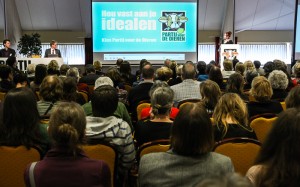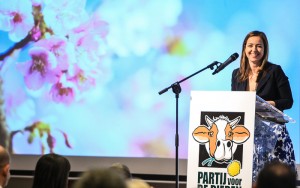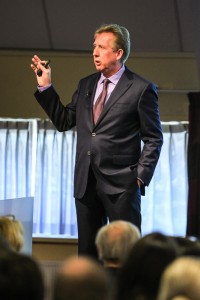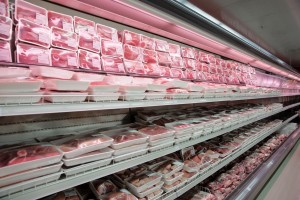Worldlog Semana 16 – 2013
El Domingo 7 de Abril tuvimos nuevamente un cálido congreso de partido en Doorn con gran afluencia de gente. Entre otras cosas tuvimos un hermoso discurso del profesor Jan Rotmans. El citó a Herman Verhagen: No vivimos en una época de cambios, sino en un cambio de épocas.¡Una fuerte expresión!
Yo hice preguntas a la Cámara sobre la presencia de animales caseros en el alimento animal. La semana pasada apareció un artículo en el periódico NRC donde se señala que en España los perros callejeros, animales atropellados y animales caseros se usan en productos que se venden como materia prima para alimentos. Existe la posibilidad que este alimento también se entrega a empresas holandesas. Una empresa holandesa está bajo sospecha de participar en esto. Nosotros pensamos que se debe quitar el permiso a esta empresa.
Y otro escándalo de gran magnitud en la carne. ¡se sospecha que 50 millones de kilos de carne sospechosa han sido elaborados, desde el 2011, en pizas, comida en lata y preparadas!. La industria de medios alimenticios habla sobre cientos de millones de comidas en la cual se ha usado carne sospechosa. Racién ahora lo ha descubierto la Autoridad Holandesa de Alimentos y Mercancías (NVWA).
El origen de todos estos escándalos con la carne está en el hecho que la industria alimenticia usa carne lo más barata posible, y casi no se controla porque el gobierno deja que el carnicero controle su propia carne (auto-regulación) y en los últimos años se ha economizado mucho en la vigilancia del NVWA. Esto a costa de personas y animales. La NVWA debería funcionar mucho mejor para poder descubrir es prácticas fraudulentas!.
El Jueves pasado pedí un debate y posiblemente tendrá lugar la próxima semana. El Partido para los Animales desea que NVWA publique inmediatamente la lista de empresas a las que se vende esta carne, de manera que los consumidores puedan protegerse. Hasta ahora lo rehusan. La NVWA que no hay indicios que la carne pueda ser peligrosa para la salud pública, pero al mismo tiempo dice que no saben en absoluto de donde proviene la carne.Con tales falsos signos tranquilizadores la NVWA es poco confiable. Desgraciadamente en la Segunda Cámara no recibimos apoyo de los partidos tradicionales PvdA, VVD, D66 y CDA para la petición de publicar esta lista lo más rápido posible.El VVD y el CDA dijeron que no necesitaban un debate. El secretario de Estado de Asuntos Económicos debe reaccionar antes del próximo Martes a esta petición.
También Francia está de acuerdo con el pensamiento que debemos cambiar de albúminas animales a albúminas vegetales. Bonito!
Más noticias de Francia: apareció nuna hermosa recensión em el Huffington Post francés con motivo de la presentación del libro Meat the Thruth hace dos semanas en Paris.
¡Hasta la próxima semana!
On Sunday, April 7 we had a heart-warming party conference in Doorn with a huge turnout. We enjoyed such things as a fantastic speech by professor Jan Rotmans in which he quoted Herman Verhagen: We do not live in an era of change but in a change of eras. A very catchy statement!
I asked parliamentary questions about pets being found in food and cattle feed. Last week, a Dutch newspaper called NRC contained an article that touched on how in Spain, unwanted dogs, wild animals that have been hit by cars, and pets are being processed into products that are sold as such things as raw material for animal feed. It’s very possible that this feed is being supplied to Dutch businesses. A Dutch business is also suspected of being involved. As far as we’re concerned, this business should immediately lose their licence.
And yet another meat scandal of unprecedented scale. At least 50 million kilograms of suspicious meat have been added to pizzas, cans, and ready-to-eat meals since 2011! The foodstuff industry says hundreds of millions of meals have had suspicious meat included. The Dutch Food and Consumer Product Safety Authority (NVWA) say they’ve only just found out about this.
All these meat scandals are down to the fact that the food industry focuses on making meat as cheap as possible. Very few checks are performed because the government itself gives the seal of approval – which is self-regulation – and they have made considerable cuts to the NVWA’s supervision these past few years. And it is both animals and humans that pay. The NVWA needs to be able to function on a much higher level in order to be able to detect these types of fraudulent practices!
Last Thursday, I asked for a debate, which will probably take place next week. The Party for the Animals wants the NVWA to immediately publish the list of businesses to which the meat was sold, so consumers can protect themselves. They have refused to do so up to this point. The NVWA says there are no indicators that the meat poses a threat to public health, but at the same time says they absolutely do not know where the meat comes from. The NVWA are doing themselves no favours with these false reassurances. Unfortunately, we in the Lower House have received no support from the traditional parties of the Dutch Labour Party (PvdA), the People’s Party for Freedom and Democracy (VVD), D66, and the Christian Democratic Alliance (CDA) for making the list public as quickly as possible. The VVD and the CDA said they had no need of a debate. The State Secretary of Economic Affairs must now react to our request before this Tuesday.
France is warming up to the idea that we need to switch from animal to vegetable proteins. Wonderful! More news from France: there was a great review in the French Huffington Post as a result of our Meat the Truth book presentation two weeks ago in Paris.
See you next week!


